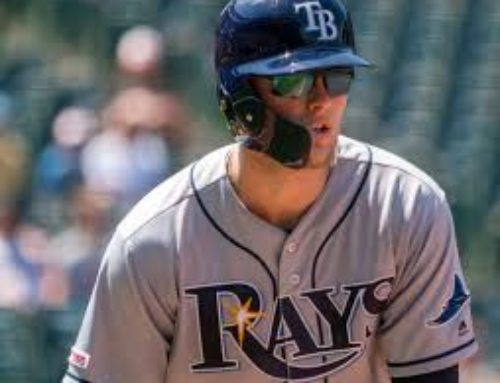That’s where Boston slugger Carl Everett hits ’em. And after the game, that’s where you’ll find him, too.
By JOEY JOHNSTON
Tribune Staff Writer
(c) Tampa Bay Times. Originally published May 5, 2000.
He’s a mystery, a riddle. Boston Red Sox center fielder Carl Everett, baseball’s latest burgeoning superstar, is from Tampa. Did you know that? Nearly 10 years ago, he was a first-round pick from Hillsborough High School.
We have stacks of memories from homegrown big-leaguers Lopez, Piniella, Garvey, Boggs, Magadan, McGriff, Gooden, Martinez, Gonzalez, Sheffield, Bell. We have documented their triumphs, their highs, their lows. They belong to us.
Carl Everett? Not on the radar screen.
Just the way he wants it.
“If I can move around without people noticing me, I’m very happy,” said Everett, 28, maybe the best outfielder in Boston since Jim Rice or Fred Lynn. “I’m not interested in promoting myself.
“I don’t want all that light. A lot of people live just to get to that point. I want to walk into a mall or a restaurant like any other normal person. That’s all I am, normal.”
At Fenway Park, where the Devil Rays visit tonight, Everett has been anything but normal. He’s hitting .352 with eight home runs and 24 RBIs. He’s a fearsome presence, a switch-hitter with a striding front-leg lift from the left side. He looks like a fullback and runs the bases with cannonball ferocity. He defends Fenway’s quirky center-field territory with tumbling, sliding catches.
Boston’s bleacher fans now wear adoring T-shirts – “I Love Carl.”
One more thing. Everett hates – absolutely hates – the Yankees. “I never liked those pinstripes,” he said. Upon hearing that, Boston fans loved him more.
THAT’S A PERFECT stopping-off point for Everett’s story. He was originally drafted by, you guessed it, the Yankees. He was the 10th pick overall in 1990, chosen before Mike Mussina, Jeromy Burnitz and Rondell White. But New York left him unprotected in the expansion draft. And that began a confusing spiral.
The Marlins rarely used him. Back in New York, Mets manager Dallas Green never much cared for him. Just when Everett hit his stride with the Astros – .325 average, 25 homers, 108 RBIs, 27 steals last season – he was traded to Boston in a fire-sale move.
Now he’s a major-league oddity – a five-tool player on his fifth organization. Seemingly, that indicates trouble. Everett turns around that assumption.
“It’s not my fault,” he said. “I can’t make anybody keep me. I’m not mad. I’m not bitter.
“Maybe they didn’t know what they had.”
What do the Red Sox have?
A great baseball player, possibly. A unique person, definitely.
When Everett attended the baseball writers’ dinner last winter in Boston, he sat quietly at his table. He grabbed a pencil and began doodling. A few minutes later, he presented a caricature sketch of new teammates Pedro Martinez and Nomar Garciaparra.
“He was just messing around,” Garciaparra said. “But it looked great. He could’ve sold it.”
Everett doesn’t show his drawings to many people. He doodled as a kid, when he had nothing else to do at home. He was fascinated by art and design. This year, his drawings were used by architects to build his family’s new home in Tampa.
He’s a loner. He sings, usually slow jazz or gospel songs, but rarely for an audience. He’s a dedicated fisherman. He cooks. When he’s photographed, he doesn’t smile. Yet he signs autographs by the boatload.
Some people say he’s weird.
“I’m me, just like you’re you,” Everett said. “I like being around the guys. I don’t have a best friend, but I get along with everyone.
“For the most part, I like sitting around with my thoughts and feelings. I was born by myself. There was no one in the womb with me. I had to make it through by myself. I don’t do what everyone else does, what the in-crowd does, so I get labeled as strange. So be it.”
BY ALL ACCOUNTS, Everett is a sensitive soul, but always a stand-up guy.
When he was 14, Everett’s bicycle was broken. For several days, he walked six miles one way to Little League practice. He played catcher through early high school. At Hillsborough, Coach Billy Reed called Everett “one of the nicest, most hard-working kids I ever coached.” Everett was a Division I football prospect, rushing for 1,000 yards as a Terrier senior.
He ran a 10.3 in the 100-yard dash. As a last-minute substitute in the 440 relay at the state meet, he contributed to a state-record 41.35 time.
“There’s a lot of things about me that people don’t know … and I don’t care for them to know,” Everett said.
Apparently, Everett’s family is one of those things. In the Red Sox media guide, amid his voluminous four-page biography, there’s no mention of his wife Linda and his five children. At his request.
Everett said he has a private family. He’s a Red Sox employee. He comes to work each day. He willingly accepts constructive criticism, even booing, if it’s warranted. Off the field, he feels his life is off-limits.
Inevitably, Everett’s past is dredged up. In 1997, he and his wife lost custody of two of their children while he played for the Mets. After a Shea Stadium child-care provider noticed bruises on the children, they were put into city custody. A family court in Queens ruled that Linda Everett used “excessive corporal punishment” and Carl Everett “failed to take appropriate action.”
The couple was sent to counseling and parenting classes. They regained custody of one child. Everett said the other was in Tampa, with family. Since the incident, they have had two more children.
“My kids are safe and it’s over with,” Everett said. “My family is a private subject. That has nothing to do with my baseball career.”
Red Sox general manager Dan Duquette said the player’s past was thoroughly researched before the club traded shortstop Adam Everett and left-handed pitcher Greg Miller to Houston for Everett on Dec. 15. Duquette loves the initial return. Red Sox manager Jimy Williams loves Everett’s versatility, his protection of Garciaparra and his toughness.
“Carl knows how to knock catchers down trying to score,” Williams said. “That tells you he’s trying to win. That’s all you need to know.”
That’s all Everett wants you to know.
MAYBE IT’S FINALLY his turn. He was too young to play on Belmont Heights’ glorious Little League World Series teams in the early 1980s. He was traded before the Marlins’ World Series run, before the Mets became respectable again. His best team, the 1998 Astros, was beaten in the first round of the playoffs.
He figures it’s also his time to shine.
“People say I had a career year, that I’ll never match it,” Everett said. “That’s fine. People have opinions. I don’t mind the devil’s advocate. I could hit .300 for 10 straight years and somebody would say, ‘He’ll never do it again.’
“Ever since Little League, I always knew I could play this game. If you give me the opportunity, nothing is going to stop me. I don’t go parading it around, but I feel that. I have a fire burning inside me.”
Everett has been passed around the majors, somewhat forgotten in his hometown. Maybe that explains the smoldering rage.
But he never allows it to overtake him. He’s still a person first, a baseball player second. Around friends, he never talks the game unless they bring it up in conversation. Even then, after answering a question, he quickly changes the subject.
If he’s recognized in public, he’ll grin and sign an autograph. Then he’ll keep walking, careful to not attract a crowd.
“Michael Jordan has to call places before he gets there, so they can clear him out a spot,” Everett said. “That’s not normal. I don’t want that. I never want that. I want to be looked at as another man.”
Baseball is Everett’s talent, his vocation. You get the feeling he’d be equally happy at something else.
“Everybody has a lot of artistry and they might not know it,” he said. “Everything doesn’t have to be done with a pencil and paper. People can do all sorts of things with their hands. It’s not all sketches.
“Sometimes, it’s not what you draw. It’s what somebody else sees. People see different things.”
That’s true of art.
It’s also true of Carl Everett.





